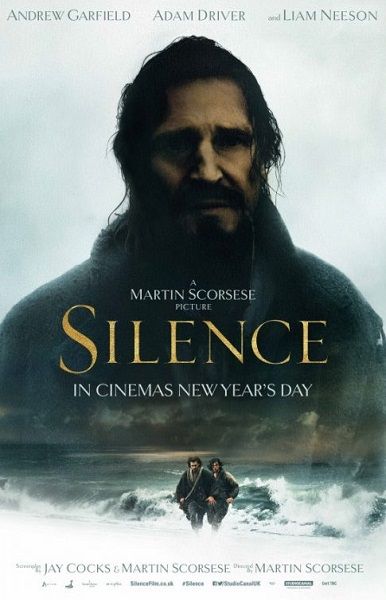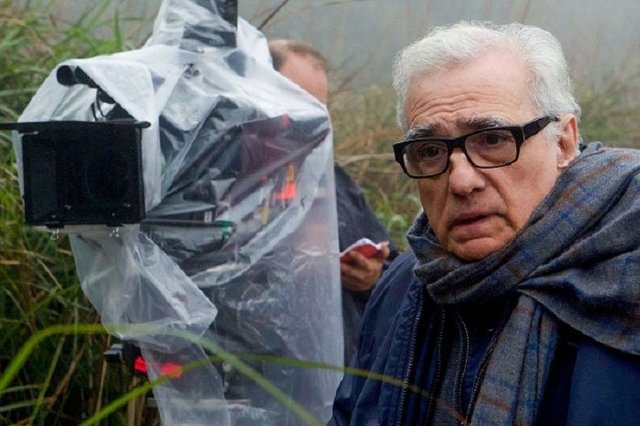"Silence" by Martin Scorsese - what a genius movie! - review
" Where is your faith?" - Christ in the Gospel of Luke 8:25
The cool distance from religious belief and its metaphysical temptations is not an obstacle to loving "Silence" - an intimate, grandiose and painfully beautiful religious epic created by the figure closest to the concept of God in the mind of the author of this text and atheist with respect to quality cinema. Martin Motherf*cking Scorsese - a crucifying great artist who always "nails" if you allow such a heretical language from the corrupt fields of the hell. In the polytheistic landscape of the seventh art, Scorsese is the ultimate demiurge. And "Silence" is a huge film dramatic and dramatically separate from almost everything else that is available in the salons these days / weeks / months / years. Massive meditation on the questions of faith, physical and mental suffering, and the paradoxes of the wished path to martyrdom.

In the seventeenth century in Japan, the collective body of the recently thriving Catholic community was subjugated and entangled by the sharp and steady sword of Tokugawa's ruling elite. The mighty aristocrats have embarked on the mission of eradicating foreign religion. They fear that Catholicism corrupts their civilization and erodes their own long-standing traditions, rituals and beliefs. Christians, known in these lands and as "Cyrus", are oppressed, persecuted, tortured and killed. There is the ending of the missionary work of the Jesuit priests from Europe, turned into targets for the inquisitors. The last preachers have a choice - to look at the suffering and death of their faithful herds of believers, or to deny themselves by Christ by stepping or spitting on his image. In the midst of terror, Portuguese priests Sebastiano Rodriguez (Andrew Garfield) and Francisco Garup (Adam Driver) want to expose themselves to the most serious risk by traveling to Japan in search of answers to the fate of their mentor, Father Ferreira (Liam Neeson). If he has renounced the faith, as is claimed, his soul must be saved.
In Japan, they meet a collection of "hidden Christians," destitute peasants forced to pray secretly and often incorrectly. The drunken, unstable Kichidjira (Yosuke Kubozuka), their leader in the mist of the island, who was the victim of an unbearable trauma and guilt, a dual, tragicomic image of Kurosawa, tugged and played by Kubozuka in the best traditions of the legendary Toshiro Mifune. The loyal, sacrificial Mokichi (Shin'ya Tsukamoto), who donates Rodriguez with a roughly made small cross. The elderly and ruined village leader, Ichizo (Yoshi Oida), with a face as a relief map of suffering, a collective image of all the oppression that local Christians keep on their skins and eyes. Young missionaries are both devastated and elevated by what they see. Rodriguez's obsession with the salvation mission of martyrdom is deepening. The contours of his desire to fulfill the steps of Jesus are noticed. Soon the rumor of the latest missionaries in Japan comes into the ear of power, and the Innocent Inquisitor Inuy (Isaiah Ogata) ran into the village of "hidden Christians," and only the self-sacrifice of the locals can temporarily save the lives of the priests.

Here, Scorsese has a repeating pattern that builds the massive structure of Silence. Believers who are faced with choosing to trample the image of God, risking the weight of weight in fire and brimstone, but saving the dead body now. And priests who have to deny publicly from Christ to deliver their followers from suffering and death. Poetic-fierce scenes of torture. Flesh consumed by fire, tissues and organs, crushed and broken by the nature or steel of the samurai sword. Scorsese's magnificent artist impaired physicality, an old master of decomposing flesh, and here the violence is backed by the weight of one of his greatest themes - faith and Catholic guilt. Carved from hunger Garoupe captured and crushed, preferring to drown in a doomed attempt to save herself from the ocean sentenced to death by his own decision Japanese Christians, but not to defile the symbol of everything that gives meaning to his life. Rodriguez, drawn from doubts brought to the limit of madness, tries to reconcile his martyrdom with the guilt of the fate of the people, who can deliver only one gesture of denial of God. Silence invades his skull as a natural disaster.
Rodriguez's conversations with Inuhe, the translator (Tadanbu Asano) and the mutated Japanese authentic Ferreira give the film a philosophical density, composing the contours of a solid theological, social and political debate. One of the greatest pleasures of watching Silence is contained in the antagonistic dialogues of the captured but caregiver Rodriguez and the sophisticated, civilized but capable of ultimate terror, his patrons. Is Japan a swamp in which the roots of the Christian religion are dying? Do they look like ugly noisy wives that have to be ousted by their wise patriarch, the European countries rivaling for cultural influence in Japan? Is universal power for good and truth Catholicism? Is it worth denying innocent people to suffering and death, but preserving your canonical purity in the image of your supposed Creator and Savior? What exactly is the manifestation of true love of Christ? What sign is the silence before the face of evil, does silence speak more clearly than every word? Can Christianity at all be thriving among people with drastically different religious concepts and understanding of the abstract nature of the biblical God? Scorsese, who was on the brink of a priestly career, offers emotionally and intellectually engaging treatment of some of the most important questions about morality, duty, religion, sacrifice and spiritual power in this epic screening of the novel of one of the most respected Japanese writers of 20th century and a famous Catholic - Shuysuku Endo.

The story of "hidden Christians" reveals to Scorsese many avenues for exploring the themes that pierce his life and creativity. "Silence" is his beautiful confession - open and intimate with rich text and texture. The metaphysical architecture of the film is felt through the strikingly poetic portrait of nature - the green mountains, the slow mist, the rich vegetation, the dense mud, the inexorable water, the bright, vibrant golden disc of the Sun: this is the first of all deities of man. "Silence" gives a voice to a lost epoch that deserves to be restored by artists like Scorsese. He, more than anyone else in the cinema, can understand the depth of faith that Darwin had for the people before, had power and meaning beyond our consciousness. Scorsese attempts to translate us into the metaphysical labyrinth of the past. Here is a shepherd who deserves to be followed.
It's an undeniably well made film and one I'll never watch again in my life!
Why you will never watch it again ? :)
Absolutely loved the movie!
I love it as his "The Last Temptation of Christ" movie, the adaptation of Nikos Kazantzakis novel :)
Huh. I found Silence to be tedious. Big fan of Last Temptation and plenty of his other movies but I feel like he hasn't really made anything substantial since The Departed. My two cents...
Actually, I found this film very difficult, which as a work of art is to its credit.
It raised a lot of not easy to answer questions, about the arrogance/violence of missionaries for example, presuming to know better and tell a people how to live/believe.
Also, as a non-Christian, it got me thinking about how Christians (even lapsed ones, artists, etc...) have a tendency to make a fetish of pain. Which is why the film itself is so gory and almost made a virtue of this suffering--as though to say, this depiction of violence is not gratuitous, but part and parcel of our (Catholic) faith...
Lastly, the enigmatic and complicated figure of Father Ferriera was truly devastating. Did he sell out? Did he deeply internalize his faith, and compromise, so he can cope with his life's circumstances. These, and the "antagonistic dialogues" that you describe so well, above, make for a disturbing work of art (that, I admit, left me in tears and in silence...)
Yes, I have the same experience - that was also the great experience that eventually left an inner silence in you at the final :)
Thank you for the comment @yahialababidi :)
Weird that this guy has amassed an amazing reputation over the years, pretty much anything he does is an instant classic, but when he makes his 'dream film' come true it's complety ignored :/ I loved Silence, everything about it!( + cinematography was impeccable )
Yes, It also impressed me a lot how he managed to make such a movie after "The Wolf of Wall Street" :D
omg, yes, a kind of antithesis. But, such is life and its "antagonistic dialogues" ;)
True, but he make it brilliant :D
There’s terrible poetry in hedonism and destruction, too... That is part of its seduction & a good artist recognizes this
Yes, people like Marquis de Sade recognizes this really well :)
Yes! The thing is that he's been planning and looking for funding for this movie for yeeears, before WoWS
I like the movie. But Scorsese cheats at the end. Should not have "entered" the coffin for that final shot. It ruined the movie for me.
For me it was the opposite - we that shot he put one paradoxical line of interpretation of the movie and it completely confuses you :D
Agreed, it's confusing. But confusing because it's totally dishonest: Scorses strays from the perfectly controlled austere realism of his movie to suddenly relapse and shout "You see, in spite of all, he is still ----". It's dogmatic, it's wishful thinking, it's hypocritical. I wish he had been more subtle with his "twist".
Unfortunately you are right. Have you seen Lars von Trier's "Nymphomaniac"? The end of the movie had the same feeling of dichotomy for me. On the one hand, there was a violent of the scripture, and it was somehow fake; on the other hand, I was stunned. The same was with "Silence" end - disappointment and shock.
Nope :-/ I love LvT but I have not seen this one(s) yet... However, speaking of Von Trier, the ending of Dogville, for example (when the "dog" appears) made totally sense in the context of the movie. I think Scorsese and Lars Von Trier are somehow linked: Scorsese is terrified about the disappearance or the silence of God... While Von Trier (in my opinion) is terrified of its possible presence and actions.
Going to watch the movie asap
nice :)
Amazing ,stories as we experience in life, good flim .
true :)
Interesting post! Now your post is listed in trending!
Thanks :)
have not seen it yet
This post has received gratitude of 12.55 % from @appreciator thanks to: @godflesh.